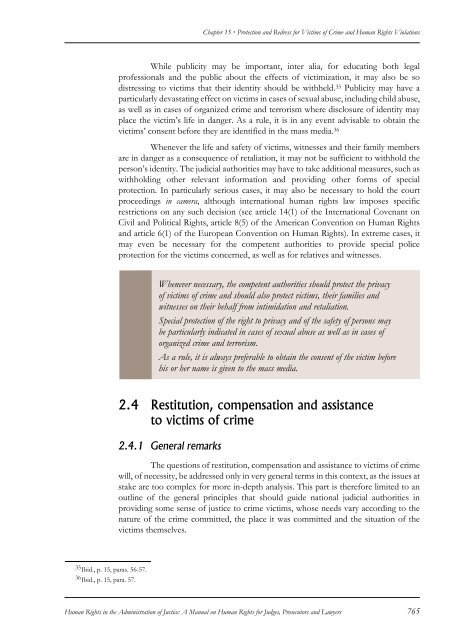protection and redress for victims of crime and human rights violations
protection and redress for victims of crime and human rights violations
protection and redress for victims of crime and human rights violations
Create successful ePaper yourself
Turn your PDF publications into a flip-book with our unique Google optimized e-Paper software.
Chapter 15 • Protection <strong>and</strong> Redress <strong>for</strong> Victims <strong>of</strong> Crime <strong>and</strong> Human Rights ViolationsWhile publicity may be important, inter alia, <strong>for</strong> educating both legalpr<strong>of</strong>essionals <strong>and</strong> the public about the effects <strong>of</strong> victimization, it may also be sodistressing to <strong>victims</strong> that their identity should be withheld. 35 Publicity may have aparticularly devastating effect on <strong>victims</strong> in cases <strong>of</strong> sexual abuse, including child abuse,as well as in cases <strong>of</strong> organized <strong>crime</strong> <strong>and</strong> terrorism where disclosure <strong>of</strong> identity mayplace the victim’s life in danger. As a rule, it is in any event advisable to obtain the<strong>victims</strong>’ consent be<strong>for</strong>e they are identified in the mass media. 36Whenever the life <strong>and</strong> safety <strong>of</strong> <strong>victims</strong>, witnesses <strong>and</strong> their family membersare in danger as a consequence <strong>of</strong> retaliation, it may not be sufficient to withhold theperson’s identity. The judicial authorities may have to take additional measures, such aswithholding other relevant in<strong>for</strong>mation <strong>and</strong> providing other <strong>for</strong>ms <strong>of</strong> special<strong>protection</strong>. In particularly serious cases, it may also be necessary to hold the courtproceedings in camera, although international <strong>human</strong> <strong>rights</strong> law imposes specificrestrictions on any such decision (see article 14(1) <strong>of</strong> the International Covenant onCivil <strong>and</strong> Political Rights, article 8(5) <strong>of</strong> the American Convention on Human Rights<strong>and</strong> article 6(1) <strong>of</strong> the European Convention on Human Rights). In extreme cases, itmay even be necessary <strong>for</strong> the competent authorities to provide special police<strong>protection</strong> <strong>for</strong> the <strong>victims</strong> concerned, as well as <strong>for</strong> relatives <strong>and</strong> witnesses.Whenever necessary, the competent authorities should protect the privacy<strong>of</strong> <strong>victims</strong> <strong>of</strong> <strong>crime</strong> <strong>and</strong> should also protect <strong>victims</strong>, their families <strong>and</strong>witnesses on their behalf from intimidation <strong>and</strong> retaliation.Special <strong>protection</strong> <strong>of</strong> the right to privacy <strong>and</strong> <strong>of</strong> the safety <strong>of</strong> persons maybe particularly indicated in cases <strong>of</strong> sexual abuse as well as in cases o<strong>for</strong>ganized <strong>crime</strong> <strong>and</strong> terrorism.As a rule, it is always preferable to obtain the consent <strong>of</strong> the victim be<strong>for</strong>ehis or her name is given to the mass media.2.4 Restitution, compensation <strong>and</strong> assistanceto <strong>victims</strong> <strong>of</strong> <strong>crime</strong>2.4.1 General remarksThe questions <strong>of</strong> restitution, compensation <strong>and</strong> assistance to <strong>victims</strong> <strong>of</strong> <strong>crime</strong>will, <strong>of</strong> necessity, be addressed only in very general terms in this context, as the issues atstake are too complex <strong>for</strong> more in-depth analysis. This part is there<strong>for</strong>e limited to anoutline <strong>of</strong> the general principles that should guide national judicial authorities inproviding some sense <strong>of</strong> justice to <strong>crime</strong> <strong>victims</strong>, whose needs vary according to thenature <strong>of</strong> the <strong>crime</strong> committed, the place it was committed <strong>and</strong> the situation <strong>of</strong> the<strong>victims</strong> themselves.35 Ibid., p. 15, paras. 56-57.36 Ibid., p. 15, para. 57.Human Rights in the Administration <strong>of</strong> Justice: A Manual on Human Rights <strong>for</strong> Judges, Prosecutors <strong>and</strong> Lawyers 765
















